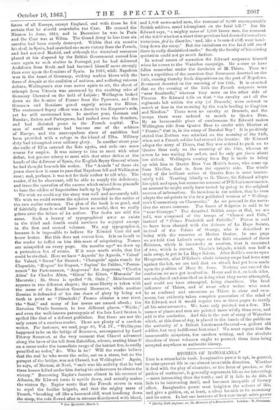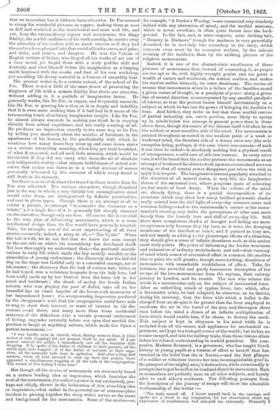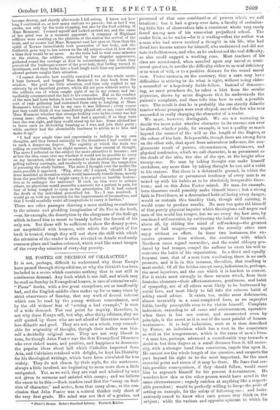STORIES OF MONOMANIA.* Tuts is a remarkable book. Imaginative power
is apt, in general, to misrepresent life in one almost invariable direction. Whether it deal with the play of character, or the force of passion, or the pathos of sentiment, it generally represents life as too interesting, —more interesting than the.truth ; and if it fails to do this, it fails to be interesting itself, and becomes incapable of literary effect. Imaginative power must heighten the colours of life, and give a golden, or, at least, a silver burnish to its monotony and its cares. In but one instance of first-rate imagieative power
• Shirley Hall Asylum; or, the Memoirs 0/a Monomaniac. London : W. Freeman.
that we remember has it hitherto been otherwise. De Foe seemed to stamp his wonderful pictures on copper, making them at once as dull and wretched as the wretchedest and most arid life, and yet, from the extraordinary vigour and minuteness, the dingy fidelity, the sordid earthiness of his workmanship, he carries away the attention of hie readers with as much success as if they had themselves been plunged into that world of leaden cares, and gains, and risks, and crimes, and dangers. He was the Vulcan of English writers of fiction, who forged all his works of art out of a base metal, yet forged them with a truly godlike skill and dexterity, and rises himself before the imagination as a limping smith begrimed with the smoke and dust of his own workshop, yet moulding his drossy material in. a furnace of unearthly heat.
The present writer is, to a certain extent, of the school of De Foe. There is not a little of the same power of presenting the dinginess of life with a minute fidelity that rivets our attention, without adding to it a particle of imaginative lustre. He generally works, like De Foe, in copper, and frequently succeeds, like De Foe, in graving his notion on it so deeply and indelibly that it is even more striking than if it had had in it more of the transmuting touch of ordinary imaginative insight. Like De Foe, he almost always succeeds in making you think he is copying directly from actual experience, and not really creating at all. He produces an impression exactly in the same way as De Foe, by telling you anxiously about the articles of furniture in the apartments of his heroes, by the particularity with which be mentions how many times they went up and came down stairs on a certain interesting morning, when they got their breakfast, of what it consisted, and all such little minutise, which would be intolerable if they did not carry with them the air of absolute and indisputable reality—that minute faithfulness of actual nar- rative that makes one listen as to a verbal account of scenes personally witnessed by the narrator of which every detail is still fresh in his memory.
Yet there is more of distinct idea traced in these stories than De Foe ever admitted. The various characters, though described just in the way in which n. very faithful but unimaginative mind would seize them, are distinguished by definite peculiarities, and cast in given types. Though there is no attempt at all to colour a picture, no attempt "to conceive the character as a whole," yet a single face of it is generally left sharply stamped on the narrative, though only one face. Of course, this is essential to the very plan of delineating monomania, which is a more intellectual design than De Foe would have generally adopted. Take, for example, one of the most unpretending of all these stories,—scarcely, indeed, a story at all,—" The Cynic." When the tali is told, we do not feel that we know the man except on the one side on which his eccentricity has developed itself. Yet how thoroughly we understand that,—the profound mortifi- cations in early life which made the boy acutely sensible to the absurdities of young enthusiasm ; the discovery that the faithful dog on the stage was faithful only to a concealed sausage, not to his master ; the discovery that the lock of auburn hair, which, as he had hoped, was a voluntary keepsake from his lady love, had been really made up by her brother from the hairs left in her comb and hairbrush ; the shock of seeing the lovely Italian actress, who was playing the part of Juliet, take off on her beautiful lips an exact imprint of the burnt cork moustache of her impassioned lover ; the overpowering impression produced by the clergyman's wish that his congregation could have tails to wag to show their interest, or want of interest in his dis- courses ;—all these, and many more than these accidental mixtures of the ridiculous with a certain personal excitement of feeling, engender naturally before our eyes that morbid dis- position to laugh at anything serious, which made the Cynic a partial monomaniac :—
" I was hardly ever in church, when, during sermon time, it [this notion of tails wagging] did not present itself to my mind. If a pet parson entered the pulpit, I immediately saw all the feminine tails wagging. If he spoke of the duties of children to their parents, all the senile male tails wagged ; if of the duties of servants to their supe- riors, all the matronly tails were in agitation. And after a long dull sermon, when all bent forward to offer up their last prayer, there appeared a simultaneous wagging of all the tails of the congregation. The return of this feeling I alone fear."
But though all the stories of monomania are necessarily based on a certain leading idea or impression, which furnishes the root of the monomania, the author's power is not exclusively, per- haps not chiefly, shown in the delineation of this absorbing idea or impressions—but rather in the powerful use of common-place incident in piecing together the story which serves as the scene and background for the monomania. Some of the stories—as, for example, "A Doctor's Wooing,"—are connected very slenderly indeed with any aberration of mind; and the morbid anatomy, which is never overdone, is often quite thrust into the back- ground. In the last, and, in some respects, most striking tale, " Memory in Madness," though the madman is very powerfully described, he is certainly but secondary in the story, which interests even more by its excessive realism, by the minute seaming of the incidents, than by the striking picture of the religious monomaniac.
Indeed, it is one of the characteristic excellences of these pictures of monomania that, instead of connecting it, as people are too apt to do, with highly-wrought genius and too great a wealth of nature and sentiment, the author realizes, and makes his readers realize intensely, its utter dreariness. The stories all assume that monomania arises in a failure of the faculties round a given centre of thought, in a paralysis of power along a given line of mental direction unaccompanied by any parallel paralysis of interest, so that the patient busies himself involuntarily on a subject on which he has lost the power of bringing his faculties to bear. And further, they make us feel that these morbid centres of partial imbecility are, cmtris paribus, more likely to spring up in minds below the average in general power than in those above them, though the centre of the disease itself will often be on the noblest or most sensitive side of the mind. The monomania is painted throughout as rooted in the weakest point of a weak or weakened mind, the dreariest side of a dreary existence (the only exception being, perhaps, in the case where monomania—if such it can then be called—is absolutely nothing but a physical result of intemperance, a mild case of delirium tremens). In every other case,it will be found that the author pictures the monomania as an attempt of weakened faculties to work uponan overstrained nervous string, so that all mental power disappears just when the wish to apply it is deepest. The imaginative interest popularly attached to this dreariest of all mental states, is very like the imaginative charm of the autumnal tree, whose gorgeous spots of colouring are but marks of local decay. When the colours of the mind are already flying, there is a partial decomposition of its structure which may show how many brilliant prismatic shades really entered into the dull light of every-day common sense and common feeling,—aud so the monomaniac's sorrow or the mono- maniac's cunning may strike the perceptions of other men more keenly than the homely love and skill of every-day life. Still these more conspicuous shades of thought and feeling are more conspicuous only because they lay bare, as it were, the decaying membrane of time intellect or heart ; and if painted as they are, and not merely as adding to the picturesque effects of a situation, they should give a sense of infinite dreariness such as this author most truly paints. His power of delineating the leaden weariness and exhaustion of ordinary wretchedness and toil—that vacancy of mind which comes of overtasked effort in common life, enables him to paint the still greater, though more striking, dreariness of monomania with remarkable truthfulness of effect. Take, for instance, the powerful and partly humourous description of the escape of the two monomaniacs from the asylum, their railway journey to London, and its results. The one who relates the whole is a monomaniac only on the subject of mechanical force. After an enfeebling attack of typhus fever, into which, after a favourable crisis, he had relapsed, he observes, as lie fancies, during his recovery, that the force with which a bullet is dis- charged from an air-gun is far greater than the force employed to condense the air in the barrel of the gun, and thereupon there rises before his mind a dream of an infinite multiplication of force which would enable him, if he chose, to destroy the earth. This subject is kept in abeyance in his mind while he is secluded from all the means and appliances for mechanical ex- periment, and kept in a tranquil corner of the world ; but he has no sooner escaped, and is in the railway train, than these visions dilate before his relaxed understanding in tenfold grandeur. His com- panion, Madame Belmont, is a governess, who has taught Greek history to young pupils at a tension of effort to herself that has resulted in the belief that she is Xerxes,—and the first glimpse of a soldier or volunteer throws her into inextinguishable grief iu the prospect of her mighty army's destruction, while occasionally it prompts her to put herself at its head and direct its movements. Both monomaniacs are perfectly sane on all other subjects, and keenly alive to each other's weakness. The following passages from the description of the journey of escape will show the admirable workmanship of the writer :-
" The train moved off. I threw myself back in the carriage and spoke not a word to my companion, for her observation about my expression of countenance had annoyed me extremely. Presently I
became drowsy, and shortly afterwards I fell asleep. I know not how Ion. I continued so, or how many stations we passed ; but at last I was awoke, not only by the train stopping, but also by the loud sobbing of Mme. Reumont. I roused myself and looked around me, and the cause of her grief was in a moment apparent. A company of Highland soldiers were awaiting on the platform of the station the arrival of the train, and no sooner had Mine. Reumont cast her eyes on them than the spirit of Xerxes immediately took possession of her body, and she forthwith gave way to her sorrow on the old subject—that in how short a time they would be no more. As the train had to wait some minutes at the station, the soldiers, attracted by her singular appearance, gathered round the carriage at first in astonishment; but when they perceived the burlesque sorrow of the poor lady, that feeling turned to merriment, and they broke into a loud laugh each time any particularly absurd gesture caught their attention.
"I cannot describe how terribly annoyed I was at the whole scene. I bent forward, and begged Mine. Reumont to lean back from the window. She paid me little attention, and then only replied to my i entreaty by an impatient gesture, which did not pass without notice by the soldiers, one of whom caught sight of me in my corner, and im- mediately communicated the fact to his comrades. Bad as the conduct of the men had been before, it now became intolerably worse. A certain sort of rade gallantry had restrained them only to laughing at Mine. Reumont's behaviour; but in my case it was different ; every coarse jest they could think of was immediately played off on me, some asking Mine. Reumont whether that strange-looking cove in the corner was her young man ; others, whether we had had a quarrel; if so they wore sure she was right, and they would stand up for her. Some advised her to leave such an ill-looking humbug as I was, and join their party ; while another had the abominable insolence to advise us to kiss and make it up." .
"I had now ample time and opportunity to indulge in my own thoughts, and they turned naturally on the inventions I had carried on to such a dangerous degree. The rapidity at which the train was rolling on contributed, in no slight manner, to that current of thought. The more I reflected on tho subject the more attractive it became ; and at last the idea came over me whether it would not be possible to carry on my invention, solely as far as related to the motive-power for pro- pelling railway carriages, and resolutely to abstain from the temptation of pursuing the study further. The more I thought over the matter the more possible it appeared. 'Why, after all,' I argued, should I keep from mankind an invention which would immensely benefit them, merely from the possibility that I might carry it to a point so terrible destruc- tive as to endanger the universe? If such an idea were to actuate others, no physician would prescribe a narcotic for a patient in pain, for fear of being tempted to carry on the prescription till it had caused the death of the individual prescribed for. No ; I was resolved. I would go on with my invention for the improvement of locomotives, and that I would manfully resist all temptations to carry it further."
There are other passages showing a more striking resemblance to the minute and plodding imagination of De Foe in the book, —as, for example, the description by the clergyman of the feelings which induced him to resort to brandy before the funeral of his only son. But these will be sufficient to show the dreary power, not unsprinkled with humour, with which the subject of the book is treated, though they will not show the skill with which the attention of the reader is often rivetted on details studiously common-place and leaden-coloured, which read like exact images of the every-day miseries of every-day poverty.
































 Previous page
Previous page